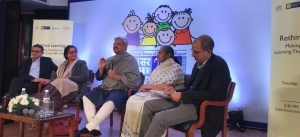Background
The Department of School Education, Government of Telangana, launched a comprehensive FLN mission on 15 August 2022, with the aim of ensuring that all primary school children (Grade 1-5) in government schools across the state achieve foundational literacy and numeracy skills. The launch of the FLN programme is significant as this was based on the “felt need” of the state. This article explores Telangana’s FLN reform journey so far through CSF’s role as a catalytic partner and the insights gained through this collaborative effort.
Over the past few decades, the state of Telangana (and earlier as a part of erstwhile United Andhra Pradesh) planned and implemented some key initiatives such as ABC (Attainment of Basic Competencies), 3Rs (Reading, wRiting and aRithmetics) and Reading campaign (READ) programmes to improve foundational learning. However, the learning levels of children across the grades remained low as reported by the government (NAS and SLAS) and non-government surveys (ASER and Azim Premji University).
To understand the problem better, CSF conducted a diagnostic study in 2021 which involved visits and stakeholder interactions. The study helped in breaking down the problem and identifying key levers for FLN reform which are expectation setting (goal setting- What is to be done?), support (materials, teacher training and mentoring support- How is it to be done?) and monitoring (monitoring student outcomes and setting up accountability systems- is it being done?).
Our Reform Approach
To address the complexities in the state and bring in FLN reform, CSF’s approach was to work in the background, anchored by the following principles:
- Collaboration: ensuring partnership and ownership of the state throughout the entire process of change.
- Humility: acknowledging and taking into account the state’s contextual and historical knowledge.
- Catalyst: CSF’s role was to be a catalytic partner leveraging the state’s strengths to work towards reform rather than owning the change and implementing it for the state.
The following section details some of the key reform steps in the state:
- Enhanced state engagement: Initially, there were reservations due to the lack of precedence for structured pedagogy. However, the presentation of evidence from studies and pilots such as Tusome (Kenya) and exposure visits for select teachers to Chattisgarh, facilitated by Room To Read, has positively influenced their perception of structured pedagogy and instilled confidence in its efficacy. Furthermore, a recognized sense of urgency and the acknowledgment of the need prompted the state to consider our recommendations. Additionally, CSF facilitated stakeholder workshops and training sessions for subject-specific State Resource Groups (SRGs) organized by the Department, equipping them to implement structured pedagogy effectively.
- Baseline student learning assessment: A baseline study, technically supported by CSF, was conducted by the state to assess ~6500 Grade 3 students’ early literacy and numeracy competencies. Using a tailored version of the Early Grade Reading Assessment-Early Grade Math Assessment (EGRA-EGMA) tools administered via Tangerine, the study found that only 4% of students met benchmark levels for literacy and 2% for numeracy. A follow-up assessment survey was conducted for over 8700 Grade 3 students this year to track changes in student achievement and identify areas requiring intervention[1].
- Structured pedagogy:
a. Learning Outcome Framework (LOF):
– The state’s teaching learning materials were restructured to include micro competencies to be taught during a lesson, this also led to CSF working with the state to design a comprehensive LOF for all subjects and grades.
– A 5+1 model (5 days of instruction + 1 day of assessment-remediation) was introduced for efficient use of instructional time, providing clarity to academic planning.
b. Teaching and learning materials (TLM):
– SRGs participated in a workshop on material creation facilitated by CSF, starting with the design of two sample teacher handbooks covering select textbook units.
– Sample lesson plans were tested by teachers in the first year, leading to positive feedback and a demand for more state-provided plans.
– This demand resulted in the creation of teacher guides with lesson plans for all textbook units and complementary student workbooks the following year.
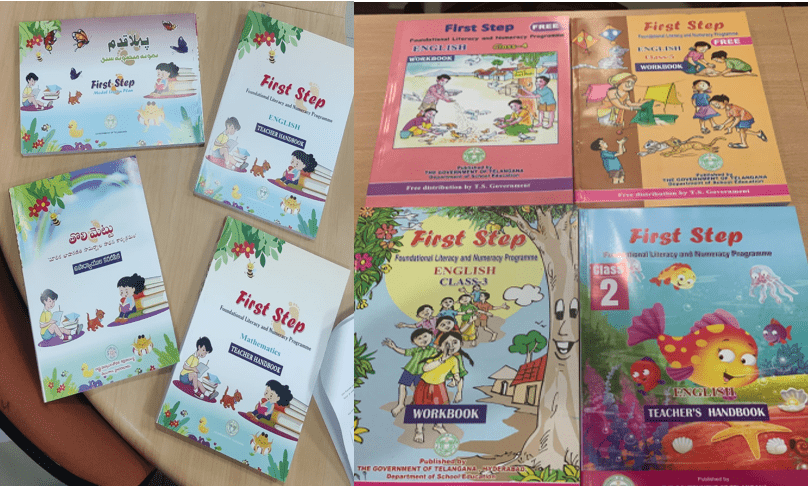
c. Teacher training
– In 2022, 53, 000 primary grade teachers received face-to-face training on the FLN mission, including detailed orientation on using sample teacher handbooks effectively.
– In 2023, the training sessions were planned and implemented with standardised session plans and availability of TLM and training resources across all cascade levels with training monitoring. ~48, 000 teachers were trained with 67% of the teachers showing improvement in post training test scores.
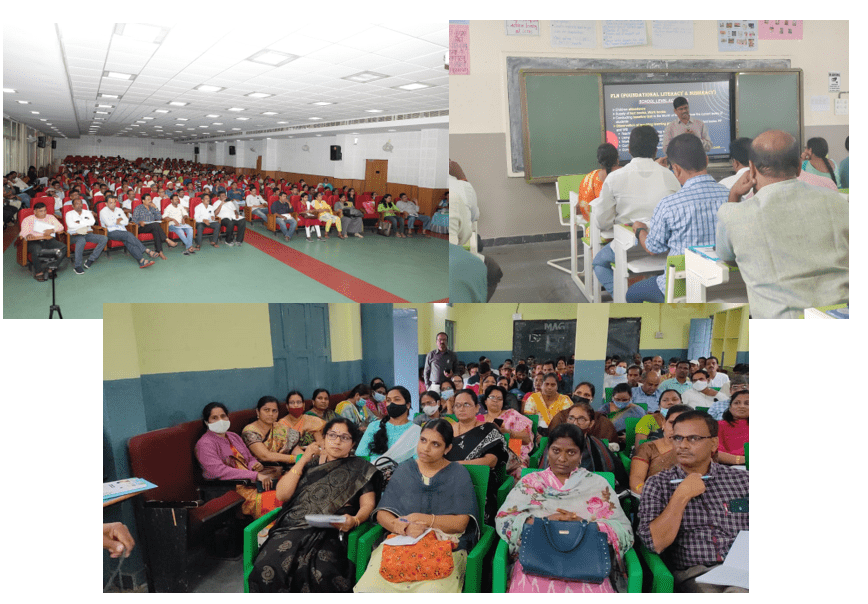
4. At-school support (supportive supervision) for teachers: The supportive supervision system comprised classroom observations, spot assessments and conversations to promote a non-punitive approach, fostering teachers’ professional growth and a positive learning environment. Senior Head Masters were designated as Mandal and Cluster FLN Nodal Officers to oversee supportive supervision, with approximately 10, 000 officials and resource persons trained for this purpose. State-level officials, including Directors and teams from SCERT and Samagra Shiksha, were also involved in visits.
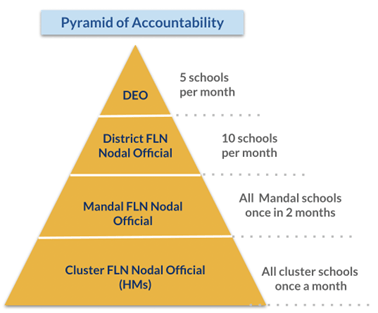
5. Monitoring: Following the principle of ‘what gets observed, gets done’, proactive measures were taken to observe classrooms and schools while maintaining records of these observations. Critical indicators such as teachers’ clarity on effective teaching-learning processes, improvement in teaching practices and enhanced student learning were monitored and recorded. CSF supported the state in doing three simple things for data collection, reporting and use:
- The state leveraged existing student assessment processes and tech systems for data collection, reporting and utilisation.
- Streamlined data on key metrics was collected using a supportive supervision tool, and a dashboard was set up for state FLN supportive supervision.
- Once the efficiency of the supportive supervision system was established, CSF assisted the state in integrating it into existing data collection systems, ensuring data usage and increasing the system’s credibility and ownership by the state.
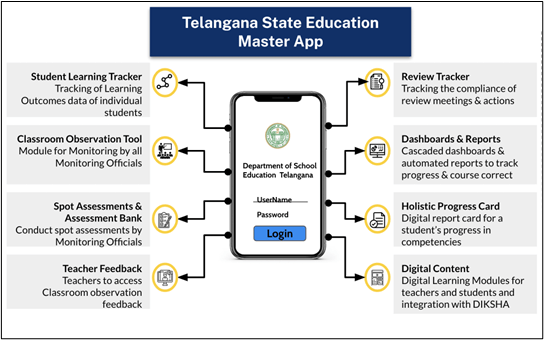
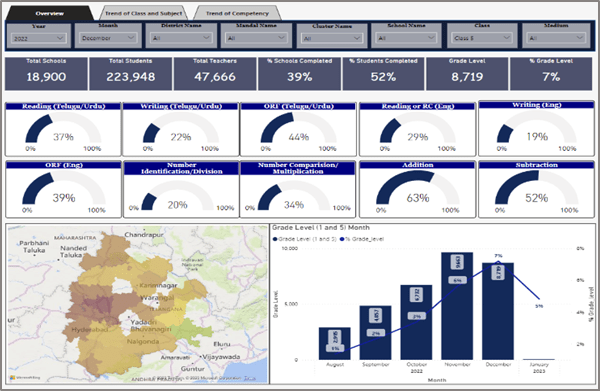
Fig. 2 – Snapshot of the state-owned platform for supportive supervision data visualisation
Progress Made So Far
Over the past two years, key reform steps gained momentum, evidenced by early adoption of academic and administrative activities under supportive supervision in Telangana. Monitoring system provided the following key insights:
- 40, 000 classroom observations conducted in 73% of schools, with 58% of teachers visited by a supportive supervision official, indicating acceptance of supportive supervision efforts.
- Pedagogy metric showed a 50% improvement in the teaching learning process from September 2022 to January 2023.
- ~10 Lakh students tested monthly in all subjects, with data from 1, 400 review meetings captured.
- Percentage of students achieving grade-level competencies increased by 10 points from September 2022 to January 2023.
- Significant improvements were seen in students achieving state FLN benchmarks in word reading (15%) and word writing (19%), as well as numeracy skills such as number identification (17%) and number comparison (11%), between 2022 and 2023.
Further, in an effort to strengthen FLN reform, CSF has extended its reach by establishing teams in three districts (Medchal-Malkajgiri, Medak and Bhadradri Kothagudem) within the state. These district teams are dedicated to amplifying the fidelity of implementation and ensuring seamless execution of programmatic inputs.
Way Forward for Telangana’s FLN Reforms
The next steps for Telangana involve deepening engagement to ensure foundational learning. CSF is collaborating with district-level administration to enhance implementation fidelity and address specific context issues. Key focus areas include:
- Improving mentoring: shifting from compliance-driven supervision to support-focused approaches. This may involve enhancing the capacity of supportive supervision cadre or staff at teacher training institutes through pilot projects and leveraging technology.
- Need-based teacher training: establishing a continuous professional development framework to empower teachers in their professional growth, providing them continuous access to relevant training.
- Addressing Multi Grade Multi Level (MGML) classrooms: implementing systematic interventions to address challenges in MGML classrooms, building on previous efforts during teacher training.
- Student learning: anchoring all efforts around enhancing student learning, using comparative data from FLN assessment surveys to identify areas for targeted interventions and improvement.
In conclusion, Telangana’s educational transformation journey for improved foundational literacy and numeracy outcomes underscores a dedicated commitment. This journey of reform, initiated by a diagnostic study and followed by collaborative engagements with the state to design state-level assessments, teaching and learning materials and supportive supervision systems, has led to significant changes in the crucial inputs such as teaching methods, materials, training and supportive supervision.
Our critical learnings from this collaborative journey with the state have been around change at scale. Our most successful approaches involved prioritising stakeholder buy-in and promoting incremental change, this was evident in TLM development and the transition of the supportive supervision system. Moreover, aligning and clarifying the “why” and having a concise “what” with support for the “how” enables quicker adoption of new ideas. Most importantly, Change is effective when driven by local system-actors addressing felt problems, overcoming resistance from external interventions.

